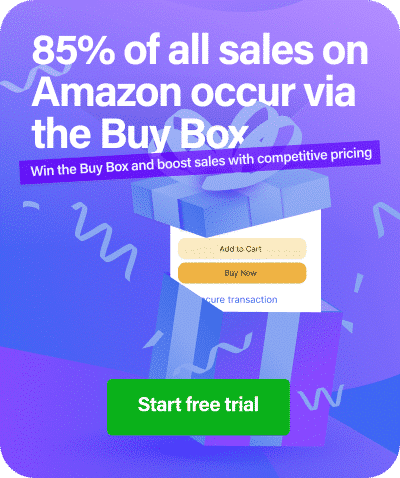There are over 600 million products for sale on Amazon, and more than 2.5 million third-party sellers. Getting your listings to stand out from the crowd and attract more buyers becomes increasingly difficult as the marketplace grows.
Thankfully, there are several tactics sellers can use to optimize their Amazon listings and make their products easily discoverable. In this article, we explore the 9 factors with the highest impact on Amazon listing optimization.
9 Amazon listing optimization essentials
1. Title optimization
If you’re among the 315 million active buyers on Amazon, you’ll notice that product titles on the marketplace tend to be quite long.
Buyers may search for specific features of the ideal product they want. And even if your product offers those features, it’s unlikely customers will find your listing if you don’t include that information in your title.
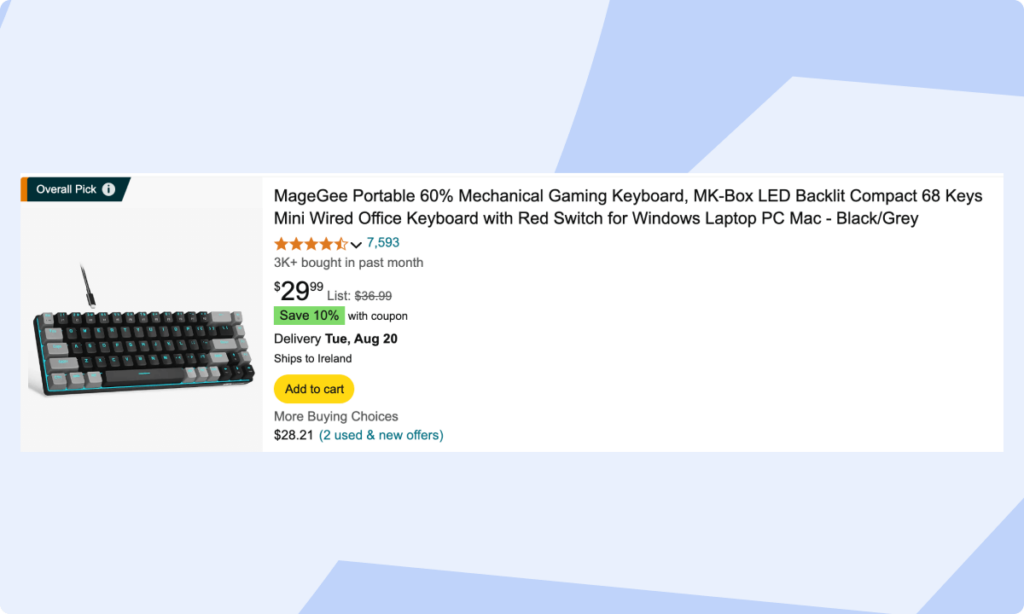
However, there are a few caveats when it comes to what you can include in your listing titles. You only have 200 characters, meaning you’ll have to be succinct while being specific. Plus, only 80 characters will show up to buyers browsing on mobile.
Amazon also has restrictions around styling your titles. You can find a detailed list in their Quick Start Guide for sellers.
For optimal results, include the brand name of the product you’re selling, details about the product’s unique selling points, and priority keywords in your title. We’ll dive into specifics on those keywords next.
2. Keyword optimization
As with optimizing a website to get found on Google, it’s vital to add the right keywords to your Amazon listings so shoppers get exposed to your products.
The first step is research. There are plenty of tools on the market to help you in this regard, like Helium10 or Ahrefs.
Amazon also provides its own keyword research tool, Product Opportunity Explorer, which offers up-to-date data on trends in customer search patterns, product demand, and profitable niches. To help you monitor and improve your rankings, you can also use their Search Query Performance dashboard.
For example, a quick search at the time of writing shows that 1M+ searches for “airfryer” happen every month on Amazon.
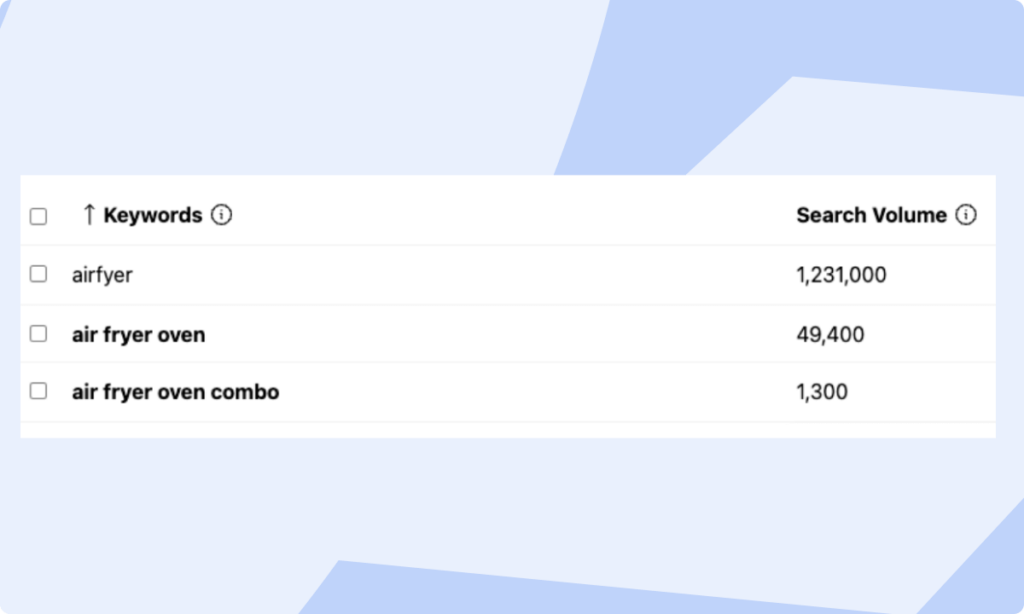
Comparatively, “air fryer oven combo” only sees 1,300 searches. While there are fewer people searching the latter, there are likely fewer sellers using the keyword, making competition lower and the likelihood of you ranking for it higher.
Therefore, you should include both short-tail, popular keywords that contain 1-2 words (like “airfryer”) and long-tail keywords that contain more words and are less competitive (like “air fryer oven combo”).
You can and should include these keywords in the Key Product Features, Product Description, and Search Terms fields when setting up your listing. However, Amazon does penalize listings that repeat keywords. So, limit each keyword you’re aiming to rank for to one of these fields, and try variations or alternate keywords for the other placements.
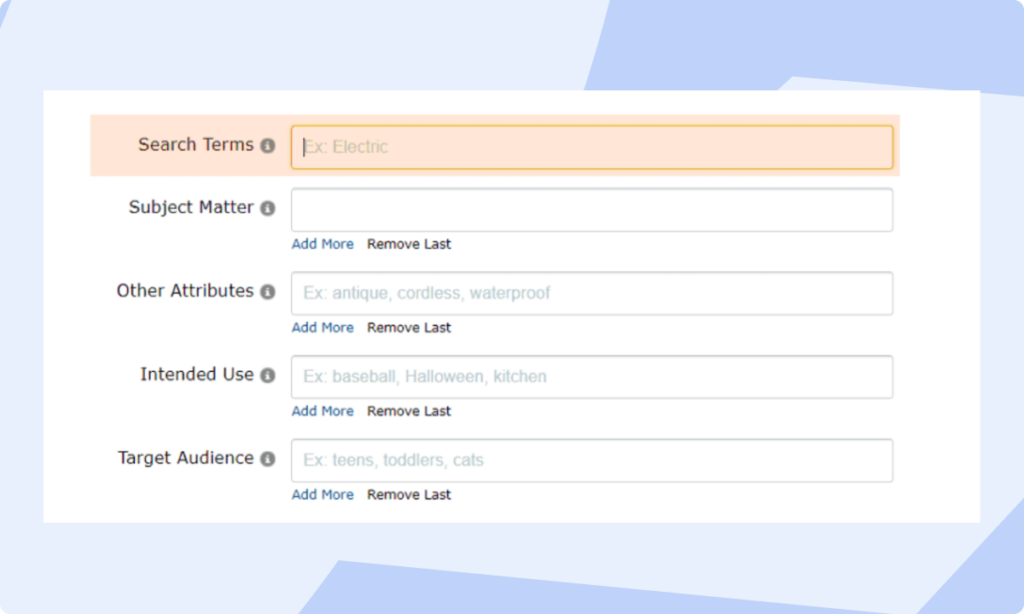
3. Image optimization
The first thing to keep in mind when preparing images for Amazon is that they have to be in one of four formats: JPEG, PNG, GIF, or TIFF.
They should also be a minimum of 1,600px in width or height. They must measure under 10,000px on any side, too. Also, the file names for your Amazon product images need to follow the format of ASIN.VARIANT.FILETYPE. For a more detailed breakdown, explore our dedicated guide to Amazon image optimization.
You should also use images that make the products stand out. Avoid busy backgrounds and stick to white to fully emphasize the product, and make sure the product takes up 85% or more of the frame. Apple utilizes this tactic extremely well in their AirPod listings.
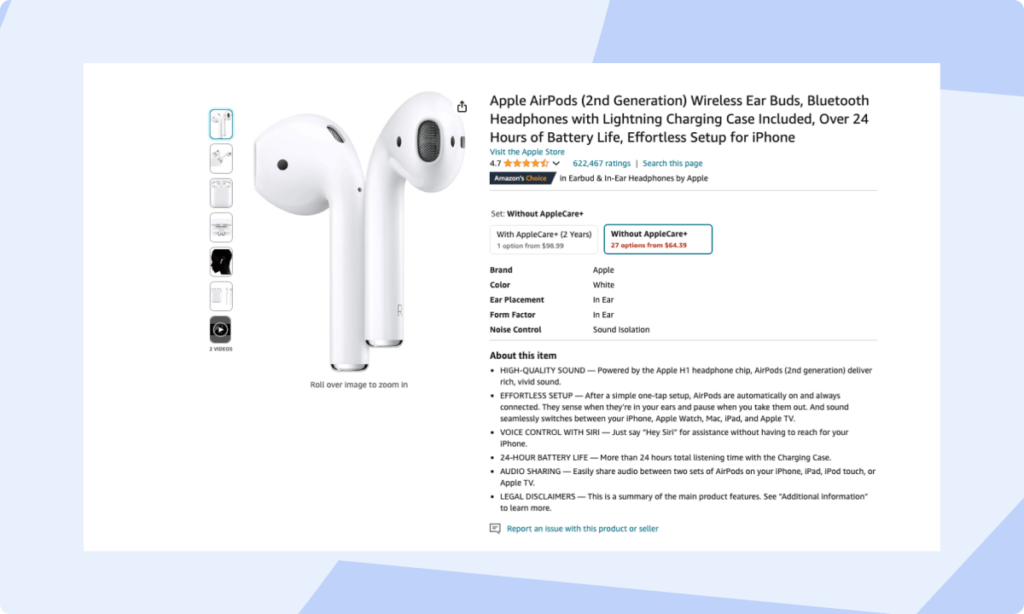
In terms of images, Amazon also has restrictions. Listings whose images depict nudity, sexual suggestion, as well as any Amazon trademarks or badges like “best seller” or “Amazon’s choice” are prohibited. It’s best to play by these rules, not only to keep your listings up, but to maintain your reputation as a trustworthy seller.
4. Bullet point optimization
On each Amazon listing, you can include up to 5 bullet points and should include a minimum of 3, per Amazon’s guidelines. Their General Listing Guidelines, as the name suggests, also apply to bullet points.
In terms of optimizing them, Amazon recommends against emojis, special characters, and hyperlinks. On the flip side, they recommend using title case, clear, natural language, and specific content around your product’s benefits to optimize bullet points for your Amazon listing.
5. Product description optimization
The product description is arguably one of the most important parts of your Amazon listing. It’s where you share your product’s identity and, ultimately, why someone should buy it. You’ve got 2,000 characters to hit the mark in that respect.
It’s important to not only state objective product details, but also to share why your product is beneficial and why a customer would want or need it. This description for some cute erasers strikes a nice balance:

You can also include keywords that you don’t have in your title or backend keyword section. Just note that, in your description, on top of the general content guidelines, Amazon also prohibits promotional language like “sale” or “free shipping”.
6. Encouraging positive customer reviews and ratings
Your reputation on Amazon holds a huge influence on how likely people are to buy your products. Positive reviews that show on your listings can increase sales by 20% or more.
While you do have the option to reach out to customers individually, it can get time-consuming and logistically complicated. Solutions like eDesk can automate the process, requesting reviews from the happiest customers to increase your rating.
7. A+ Content optimization
Third-party sellers on Amazon can access A+ Content for free, provided they’re enrolled in the Amazon Brand Registry. In short, A+ Content lets you enhance your listings by adding videos, enhanced images, customized text placements, shoppable product-comparison charts, and more to your product detail pages.
This overview from Amazon gives a good breakdown on the power of this media and how to optimize it:
8. Fulfillment options
The choice between Fulfilled by Amazon (FBA) and Fulfilled by Merchant (FBM) can have a significant impact not only on your listings, but on your business performance overall.
FBA is a very popular choice because it has the most direct impact on sellers’ listing options. Sellers who choose this route can benefit from a Prime badge on their listings, a 45% higher chance of securing the Buy Box, and the opportunity to pass responsibility for negative fulfillment feedback to Amazon. Recent statistics show that over 82% of active sellers use FBA, with these sellers saving about 70% per item shipped compared to other US fulfillment services.
9. Pricing optimization
83% of sales on Amazon happen through the Buy Box, and one of the most crucial factors in winning that real estate is having the most competitive price. This is one of the most challenging aspects of Amazon listing optimization, because it requires rigorous monitoring of prices in real time.
Automated tools like Repricer.com can help. Sellers can use them to monitor competitor pricing and market conditions, adjusting prices proactively to stay competitive. For example, if a competitor lowers their price, Repricer can respond within seconds, keeping the listing attractive to price-sensitive customers and improving the chances of winning the Amazon Buy Box and, in turn, more sales.
In conclusion
According to Jeff Bezos, everything Amazon does is focused on the customer experience: “The most important single thing is to focus obsessively on the customer. Our goal is to be earth’s most customer-centric company.”
To make sure your listings are hitting that high standard, follow the steps above for Amazon listing optimization, and leverage this free trial of Repricer to offer your customers the most appealing price.


